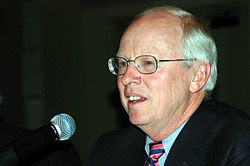Los Angeles, California
The Pew Forum interviewed Dr. Donald Miller of the University of Southern California in conjunction with a roundtable on pentecostalism it co-sponsored with the Pacific Council on International Policy in Los Angeles, Calif. Dr. Miller discussed the birth and evolution of pentecostalism and the implications of the movement for social change and international politics, especially in the developing world.
Featuring: Donald Miller, Firestone Professor of Religion, Executive Director of the Center for Religion and Civic Culture and Director of the School of Religion, University of Southern California
Interviewer: Erin O’Connell, Associate Director of Programs, Pew Forum on Religion & Public Life

Many people around the world are celebrating this year the 100th anniversary of the birth of modern pentecostalism. What exactly is pentecostalism?
It is a movement within Protestant Christianity that emphasizes the gifts of the Holy Spirit — specifically, speaking in tongues, or what scholars call glossolalia, as well as supernatural healing and other manifestations of the Holy Spirit. Historically, it evolved out of the 19th century Holiness movement associated with the Wesleyan revivals.
Where did pentecostalism actually start?
Historians trace the movement back to Topeka, Kansas, in 1901, when student Agnes Ozman received the gift of tongues during a prayer meeting at Charles Fox Parham’s Bethel Bible College. Parham, who had been raised in the Methodist movement, then traveled to Houston, Texas, where William J. Seymour, an African-American, heard Parham speak in 1905 — although Seymour had to sit outside the room because of his race.
But isn’t pentecostalism often associated with the Azusa Street revival in Los Angeles?
Yes. On April 9, 1906, Seymour was attending a prayer meeting in the home of Edward Lee in Los Angeles when Lee experienced what he claimed was an infilling of the Holy Spirit. Several days later, on April 12th, Seymour had the same experience. The news of these manifestations spread like wildfire in the Los Angeles community. By the third week of April, when the Los Angeles Times ran a front page article describing what it headlined as a “Weird Babel of Tongues,” this growing congregation of Anglos and African-Americans had rented an abandoned African Methodist Episcopal Church at 312 Azusa Street in Los Angeles.
So did pentecostalism continue as an interracial movement?
For the first decade the movement was comprised largely of poor Anglos and African-Americans, but as it organized into the Apostolic Faith Mission, the church split along racial lines. In the early years of the movement, women also had a prominent role. The most famous pentecostal woman is undoubtedly Aimee Semple McPherson, who founded the Church of the Foursquare Gospel in the early 1920s in Los Angeles. Today, however, men occupy most of the pulpits in the pentecostal movement.
How do pentecostals differ from, say, evangelical Protestants and fundamentalists?
The core beliefs of evangelicals and pentecostals are very similar, except that evangelicals tend to think that speaking in tongues, healing and other first century manifestations of the Holy Spirit were unique to the early Christian church and are no longer appropriate elements of Christian practice. Fundamentalism was originally a protest against theological liberalism and reasserted the importance of specific beliefs, such as the divinity of Christ and the bodily resurrection of Jesus.
So how did pentecostalism become a worldwide movement?
The Azusa Street revival launched an energetic missionary movement with hundreds of relatively uneducated converts heading off to “foreign lands” to preach the gospel before Christ returned. Oftentimes they went with “one-way” tickets, believing that the rapture was imminent. While their lack of theological sophistication scandalized many clergy within the mainline denominations, these missionaries were able to communicate with people in plain language, and they followed the practice of Jesus’ disciples by casting out demons, healing the sick and experientially demonstrating the truth of the Christian gospel.
Is it correct, then, to say that pentecostalism is an American religion?
This point is disputed. Some scholars claim that pentecostalism emerged nearly simultaneously in places where no missionaries had traveled. And today, it is clear that the growth of pentecostalism is primarily fueled by indigenous groups. However, the origins of the movement are certainly American, unless, of course, one looks back to the first century and the account of Pentecost in the second chapter of the Book of Acts in the New Testament.
So how many pentecostals are there in the world?
Because pentecostalism is such a diverse religious movement, estimates vary widely depending on one’s definition. The World Christian Encyclopedia‘s figure of 500 million is oftentimes cited; it includes all “renewalists,” that is, pentecostals as well as charismatics and what are sometimes called neo-charismatic Christians. Even if these figures are somewhat inflated, it is undoubtedly accurate to say that pentecostalism is the fastest growing Christian movement in the world and ranks second to Catholicism in numbers — especially if one assembles all of the different factions of the pentecostal movement. Approximately one quarter of all Christians in the world today are pentecostals or charismatics of one stripe or another. This represents an exponential increase from 30 years ago when, according to the World Christian Encyclopedia, only 6 percent of the world’s Christians fit this classification.
Geographically, where are the greatest concentrations of pentecostals?
According to the World Christian Database, there are nearly 80 million renewalists in the United States, including pentecostals, charismatics and neo-charismatics. However, the majority of pentecostals reside in the developing world. The World Christian Database estimates that there are 84 million renewalists in Brazil — the highest of any country in the world — 72 million in China, 41 million in Nigeria, 38 million in India and 25 million in the Philippines.
What is the source of these new converts?
In Latin America, pentecostals are attracting many nominal Catholics. In fact, Roman Catholic clergy sometimes refer to pentecostals as “sheep stealers.” However, there is also a vibrant renewal movement within Catholicism that identifies not with pentecostalism but with the so-called charismatic movement — which emerged in the late 1950s and picked up steam in the 1960s, ’70s and ’80s in both mainline Protestant denominations as well as in Catholic churches.
What are the differences between pentecostals, charismatic Christians and neo-charismatic Christians?
The primary difference is that pentecostals typically belong to one of the historic pentecostal denominations, such as the Assemblies of God, the Church of God in Christ (COGIC), the Church of God (Cleveland), the Foursquare Gospel, etc. Within these denominations there has been a historic focus on the “baptism of the Holy Spirit” or speaking in tongues. The charismatic movement is much more diffuse. Sometimes there is a small element within a mainline Protestant or Catholic church that is charismatic. The service is typically led by someone who has had an experience of the in-filling of the Holy Spirit, but this experience may not involve tongues; it may be an experience of healing or some other “sign” that the Holy Spirit is an active force within everyday life. The worship in charismatic churches is typically “warm” and relatively spontaneous, with a strong emphasis on prayer, along with opportunities for various “words of knowledge,” or even prophecy, from lay members of the congregation. Neo-charismatics worship in independent churches or denominations that are outside of either historic pentecostal denominations or mainline Protestant or Catholic denominations.
What about in Africa? What is the source of new converts to pentecostalism?
Some scholars claim that pentecostalism resonates with people who have grown up in animistic societies. After all, pentecostals believe in a spirit world but claim that there is only one “true” spirit, the Holy Spirit. In the name of Jesus, “evil” spirits are cast out. This has a liberating impact on people who experience themselves as being controlled by multiple spirits.
Your mention of liberation reminds me of liberation theology. Isn’t it a strong alternative to pentecostalism among Catholics?
I should point out that liberation theology is most frequently associated with Latin America, less so with Africa. With that said, I interviewed a theologian in Argentina who quipped, “Liberation theology opted for the poor, and the poor opted for pentecostalism.” Indeed, I think this is the case. In spite of the base communities advocated by liberation theologians, pentecostals have been more successful in dealing with the felt needs of poor people — and especially women. The first converts to pentecostalism are often women who are attracted to the warmth of pentecostal worship and the fact that they quickly find a role within the extended church family. Pentecostal churches also provide an alternative moral world for poor families, one that is rather puritanical in that it proscribes drinking, gambling, womanizing by the husbands of these converts and so on.
So what is the consequence of following this strict ethic?
First of all, husbands who convert to pentecostalism typically are less abusive. Secondly, they often become more responsible fathers and husbands, caring for their children and spouse. But perhaps even more dramatic is the fact that families often experience upward social mobility. How? Because the money that was being wasted on alcohol, gambling and womanizing is now available to educate one’s children, invest in small businesses and so on. Pentecostalism is the newest expression of the linkage that Max Weber, the German sociologist, saw between wealth creation and the Protestant work ethic.
Is this simply an individualistic ethic, or are pentecostals becoming involved in transforming their communities?
Much of their social involvement is at an informal level. A number of the pentecostal churches that I have studied are divided into cell groups of a half dozen to a dozen church members. In addition to worshiping on Sunday, they also meet in homes during the week. It is in their cell group that they find out if members are sick, if they have lost their job, etc. These cell groups function like extended families in that members care for each other when they are in need. In addition, many cell groups have internalized the ethic of Jesus and see it as their responsibility to care for their neighbors. Indirectly, this neighborly love becomes a recruiting tool for attracting new members to join one’s cell group and eventually to attend church.
But what about formal social programs? Are pentecostal churches creating these?
In the course of my travel in 20 developing countries over the last five years, I have documented a number of instances where pentecostal churches have created social ministries. Some of these are quite individualistic — providing food for people who are hungry or shelter for those who are homeless. But, increasingly, pentecostal churches are starting day care centers for working moms, schools that are vastly superior to government-run education programs, programs that provide medical assistance at low cost, and some churches are partnering with international NGOs to provide micro-credit loans, job training and so on. Pentecostal churches are also starting to tackle the AIDS crisis — in part because it is now a problem among their own congregational members.
Are pentecostal churches advocating the use of condoms?
Only rarely. They tend to equate condom use with promiscuity. However, increasingly they are realizing that a large number of people with AIDS are children who are infected at birth and wives who are contracting the virus from their promiscuous husbands. Hence, among married couples, if one partner has AIDS, pastors will often advise use of condoms. Increasingly, pentecostal churches are playing an important role in educating their communities about the source of AIDS and are advocating that young people avoid sex until marriage.
What about politics? Are pentecostals advocating that people vote? Are they running candidates for office?
In a few countries where there are significant populations of pentecostals, such as Brazil, there are pentecostals running for public office. However, opinion polls show that pentecostals are not uniformly voting for the same candidates. Sometimes they are on the left and sometimes on the right. Social class seems to be as important a variable as religious identification. Rather than direct engagement in politics, the tendency among pentecostals seems to be the creation of “alternative institutions.” Rather than butt heads with what they consider corrupt government officials, their strategy is one of “growing” a new crop of civic, business and educational leaders from the ground up, with the hope that these individuals will infiltrate institutions and thereby inspire a higher level of moral engagement.
So what role do you think pentecostalism will have politically in the future?
The first thing to realize is that pentecostalism is not a uniform phenomenon. So one needs to ask what role various elements of the pentecostal movement will play. For example, there are a number of pentecostal churches that promote what is often referred to as the “prosperity gospel.” In its crudest form, health and wealth are correlated with the amount of money that one puts in the collection plate. This form of pentecostalism is potentially exploitative and sometimes positively dangerous when people with AIDS, for example, turn to faith healing rather than medication to deal with their disease. On the other hand, I am encouraged by the development of what Ted Yamamori and I have called “progressive pentecostalism” in a forthcoming book that will be published next year by the University of California Press. This movement within pentecostalism is not simply waiting for the imminent return of Christ. Instead, pentecostals are acting out the Jesus ethic through acts of compassion for individuals who are in need — both within their fold and in the larger community.
Are they also engaging larger issues of institutional or structural change within their communities?
Only a few pentecostal theologians are really addressing issues of justice and equality. But perhaps this will occur with greater frequency as the movement matures. After all, modern pentecostalism is only 100 years old.
In your opinion, is there a pentecostal equivalent of Islamic militancy?
Pentecostals, perhaps like Islamic militants, tend to see the world in dualistic, either-or terms. They do not share a pluralistic worldview. Christianity is the only way to heaven; all others will be damned. Increasingly, they are open to collaborating with other members of the Christian communion, but, typically, they are still a little suspicious of Catholics, whom they see as overly ritualistic and lacking a personal, unmediated relationship with God. Nevertheless, my personal opinion is that pentecostalism will not become politically militant. They entrust the future of the world to God. To the extent that they are God’s hands and feet in this world, it is to be of compassionate service to the poor and dispossessed. Since there is no centralized authority in pentecostalism, as there is in Roman Catholicism, it is possible that some faction within the movement could decide to mobilize God’s army in a righteous crusade, but I don’t see this as the inherent logic of the movement. They are much more interested in “saving souls” by spiritual means than in imposing their beliefs and moral practices on others through violence or coercive political power.
Finally, why should people who don’t particularly care about religion be interested in pentecostalism? Why are pentecostals important for global politics and world affairs?
Thanks for ending with an easy question! My first response is that pentecostalism is reshaping Christianity. Numerically, Christianity is being turned upside down. The growing edge of Christianity is in the global South, not in the West — even though that is the origin of the missionary movement. Indeed, we may even be witnessing a reverse missionary movement of sorts, with Christians coming from places like Rwanda and Nigeria to evangelize “the heathens” in the United States. Some of the current tensions in the Anglican Communion reflect this reversal.
At the risk of offending my liberal colleagues, I also think there is another interesting dimension of pentecostalism. Rather than thinking of it as being anti-modern, it is possible that pentecostals may actually be culturally avant-garde. Why? Because pentecostals never made the mind-body separation that characterized much of Western Christianity since the Enlightenment. Today there is an increasing interest in affirming the unity of mind and body, and therefore the validity of religious experience. Equating religion with beliefs is viewed as artificial and excessively cognitive by many Gen-Xers. In contrast, pentecostal worship combines beliefs and experience in a rather postmodern way that gives authority to individual interpretation and validation.




